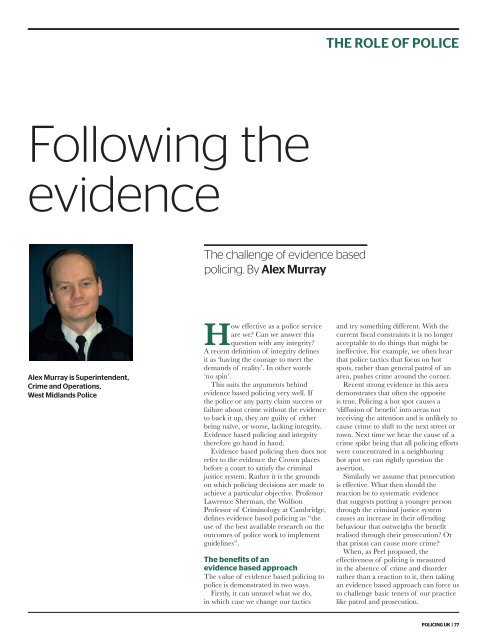Policing UK 2013 - Police Federation
Policing UK 2013 - Police Federation
Policing UK 2013 - Police Federation
You also want an ePaper? Increase the reach of your titles
YUMPU automatically turns print PDFs into web optimized ePapers that Google loves.
THE ROLE OF POLICE<br />
Following the<br />
evidence<br />
The challenge of evidence based<br />
policing. By Alex Murray<br />
Alex Murray is Superintendent,<br />
Crime and Operations,<br />
West Midlands <strong>Police</strong><br />
How effective as a police service<br />
are we? Can we answer this<br />
question with any integrity?<br />
A recent definition of integrity defines<br />
it as ‘having the courage to meet the<br />
demands of reality’. In other words<br />
‘no spin’.<br />
This suits the arguments behind<br />
evidence based policing very well. If<br />
the police or any party claim success or<br />
failure about crime without the evidence<br />
to back it up, they are guilty of either<br />
being naïve, or worse, lacking integrity.<br />
Evidence based policing and integrity<br />
therefore go hand in hand.<br />
Evidence based policing then does not<br />
refer to the evidence the Crown places<br />
before a court to satisfy the criminal<br />
justice system. Rather it is the grounds<br />
on which policing decisions are made to<br />
achieve a particular objective. Professor<br />
Lawrence Sherman, the Wolfson<br />
Professor of Criminology at Cambridge,<br />
defines evidence based policing as the<br />
use of the best available research on the<br />
outcomes of police work to implement<br />
guidelines”.<br />
The benefits of an<br />
evidence based approach<br />
The value of evidence based policing to<br />
police is demonstrated in two ways.<br />
Firstly, it can unravel what we do,<br />
in which case we change our tactics<br />
and try something different. With the<br />
current fiscal constraints it is no longer<br />
acceptable to do things that might be<br />
ineffective. For example, we often hear<br />
that police tactics that focus on hot<br />
spots, rather than general patrol of an<br />
area, pushes crime around the corner.<br />
Recent strong evidence in this area<br />
demonstrates that often the opposite<br />
is true. <strong>Policing</strong> a hot spot causes a<br />
‘diffusion of benefit’ into areas not<br />
receiving the attention and is unlikely to<br />
cause crime to shift to the next street or<br />
town. Next time we hear the cause of a<br />
crime spike being that all policing efforts<br />
were concentrated in a neighboring<br />
hot spot we can rightly question the<br />
assertion.<br />
Similarly we assume that prosecution<br />
is effective. What then should the<br />
reaction be to systematic evidence<br />
that suggests putting a younger person<br />
through the criminal justice system<br />
causes an increase in their offending<br />
behaviour that outweighs the benefit<br />
realised through their prosecution? Or<br />
that prison can cause more crime?<br />
When, as Peel proposed, the<br />
effectiveness of policing is measured<br />
in the absence of crime and disorder<br />
rather than a reaction to it, then taking<br />
an evidence based approach can force us<br />
to challenge basic tenets of our practice<br />
like patrol and prosecution.<br />
POLICING <strong>UK</strong> | 77
















